How the System Shock reboot is changing System Shock
New concept art and a chat with the game director about how Nightdive is adapting a classic into a modern game.
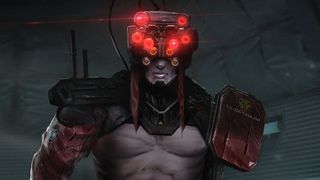
To build a ruined space station, you have to start with a fresh one. This new selection of concept art from Nightdive Studios' reboot of System Shock presents Citadel Station in the midst of its hostile takeover by rogue AI SHODAN. It's not quite the scuffed and broken station the player will see when they wake up from their coma, but by starting with concepts for a functional space station, Nightdive's artists know where to put the rubble.
"I kind of got this from working on Fallout: New Vegas," says game director Jason Fader. "Start with how things looked pre-war, as far as Fallout context goes, and then after we understand how things started, mess it up."
Of course, System Shock already has levels, but this reboot isn't an exact replica of the Warren Spector-led 1994 shooter which inspired so many immersive sims that came after it, most recently Prey. The spirit of the original's space station remains, or it will if Nightdive gets 'em right, but the decks are being rebuilt for the Unreal Engine with modern design ideas.
"Our level philosophy is essentially to take the original levels and the decks of Shock 1, and assess what still works and what may be too frustrating for players," says Fader, "and basically chisel away or overhaul certain sections so that it basically aligns with player expectations for a modern game today. I mean, we're still going to have labyrinthine and mazelike areas."

Fader points to the maintenance deck—see a comparison between the original and concept art for the new System Shock above—as an example. The slanted walls remain, and because the new team's takeaway was that "the original developers wanted the player to feel lost in this," it'll be a labyrinth here, too.
"Level design itself I wouldn't say is a complete do-over," says Fader. "It's more looking at the original and seeing what works, and what could be better, and revamping the levels."
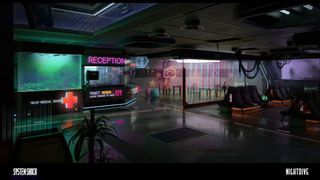
A lot more can be rendered now than could be in 1994, too. Above is a not quite pristine, not totally wrecked concept for the medical deck. Nightdive's designers are thinking about what would be in a real corporate medical facility of the future. There's a pediatrics waiting room with a perhaps well-intentioned but creepy teddy bear hologram. There's a holographic fish tank. There's an oppressiveness to the uncomfortable-looking chairs in the waiting area.
Comic deals, prizes and latest news
Sign up to get the best content of the week, and great gaming deals, as picked by the editors.
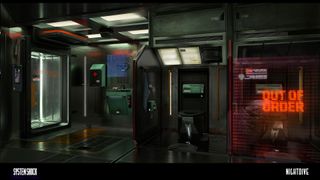
In the medical deck bathroom concept above, the stalls are made private with holograms instead of actual doors, "kind of selling the idea that you don't have any privacy in this future, the corporation pretty much owns everything." There's a sensible decontamination shower, as well.
"One of the things that we kind of joked about in the project is not enough care or attention really goes into bathrooms for videogames," says Fader, "so we had our artist sit down and figure out, 'What would a bathroom of the future look like,' but still be something that's cyberpunk, semi-dystopian."
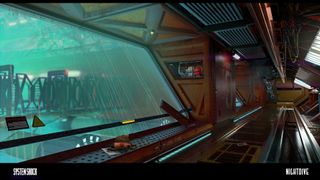
As new and shiny as it all appears (and remember, these concepts don't necessarily represent the final, dilapidated state of the space station), it all looks System Shock-ey. The engineering deck concept above, for instance, emphasizes the orange and teal contrasts from the original level.
"This is basically TriOptimum's version of Black Mesa from Half-Life, where there's some clandestine research experiments, things that are very, very secretive," as Fader describes it. One of the fellows mutilated with all this research starred on the original System Shock's boxart: the cyborg commander, one of SHODAN's human-machine hybrids, called the Cyborg Elite Guard in the original.
The look of him hasn't changed much (see his concept art below), but he has changed. "The cyborg commander is a squad leader," says Fader. "The player is going to encounter this guy in typically in squads of four or five other cyborgs, where the commander is their leader, and the other cyborgs are the footsoldiers." Kill the commander, and the other enemies will react by becoming more disorganized.
Tough enemies like the cyborg commander will be introduced in a "showcase moment," says Fader, sort of like a boss fight, before becoming part of the usual cast of enemies. "We want to slowly ease the player into learning how these guys function and behave, so that the player can defeat them," he says.
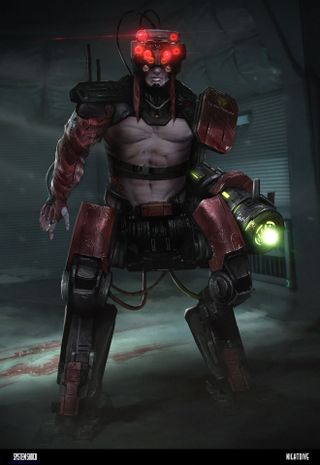
Unless I'm vastly misremembering System Shock, these ideas point to a decidedly modern approach. This is a new version of System Shock, then, a modern immersive sim that draws heavily from the original, but also from the past 20 years of game design.
Looking Glass is looking
I asked Jason for the most outlandish idea one of their backers has offered, and his example was a game I very much want to play: a Dungeon Keeper-style game in which you play as SHODAN "controlling all of her cyborgs and minions trying to kill the player." Jason agreed that it would be brilliant, but noted that it would be an entirely different game. I told him it shouldn't be that hard to just make two games, so we'll see.
One thing that remains the same is the story. It's not changing—you're a hacker on a space station that's been turned into a death carnival by an AI gone evil—though the script has been slightly tweaked with the help of Chris Avellone.
"System Shock to me is very much a Die Hard story," says Fader, "where it's one person against insurmountable odds, using their wits and craftiness to beat a manic. Unfortunately, I'd love it if Alan Rickman could play SHODAN, but there are several impossibilities with that."
Despite the tragic impossibility of it (Alan Rickman died of cancer last year), Fader doesn't really mean that he'd want anyone else to voice the evil AI. SHODAN is still voiced by the original voice actor, Terri Brosius, who Fader says has nearly total creative control over the character. Her husband, Eric Brosius (who also worked at the original System Shock studio, Looking Glass), is processing her voice with creepy pitch changes. It doesn't sound identical to the original voice work, but it can't be called inauthentic: Terri Brosius is SHODAN, now and then.
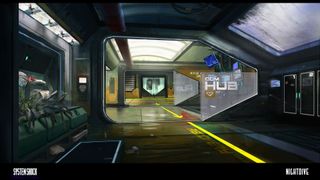
Part of loving something is loving its quirks and inconsistencies, its mistakes.
What is changing is being well-considered, according to Fader. Nightdive is consulting with System Shock's original designers, and learning what they would've changed in the original if they could go back. Level designers Dorian Hart and Austin Grossman brought up believability, for instance. "They put a few things in the game and didn't really explain them, and if you were to play the game now, some of those things don't kind of make sense," says Fader.
If you've never played System Shock, you probably won't be bothered by this example, which involves a pair of roller skates. There were roller skates in System Shock. It doesn't make a lot of sense, so Fader says they're being changed—still with roughly the same functionality (gotta go fast), but more believably something you'd find on a futuristic space station.
I wonder how fans of the original will feel about one of its weird, nonsensical items being reworked to make more sense? Part of loving something is loving its quirks and inconsistencies, its mistakes—so it's a worrying task to 'fix' a classic. It doesn't matter if the creators have been consulted, or are even directly involved. Just because he created Star Wars doesn't make George Lucas trying to fix it any better.
It's a precarious spot to be in, but Fader and Nightdive don't seem at all incapacitated by the caution it takes. The levels will be a bit different, and there will be new ways to approach problems, new tools, in the figurative sense, and the enemies will behave differently. It's not exactly the same game, and I have to imagine it would be hard—approximately impossible—to exactly copy a 23-year-old game into a new engine. Fader and the Nightdive team are creative, and as faithful as it may end up being, this new System Shock will be their creation.
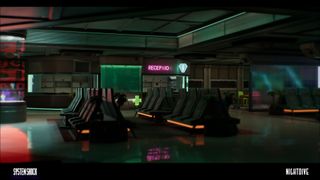
Of course, it's not as if the original, which Nightdive recently remastered to make it easier to play on modern systems, is going away, so I'm happy to keep an open mind. There's no date set for the reboot's release, but it seems likely that it's a ways off. Fader says that System Shock is currently in pre-production. A playable build has been created, and Nightdive is now working toward building a vertical slice: a complete deck of the space station "that will cover every feature but at a shallow depth." After that, Nightdive will "ramp the team up" and move on to production.
Well over a million dollars has been raised for the game on Kickstarter, with more backer funding now coming through BackerKit—so there are a lot of fans of the original to please. According to Fader and community manager Karlee Wetzel, interacting with their backers has been a great help, especially in their Discord server. They'll be the real litmus test as System Shock develops: If the people who loved the original enough to put money down on a reboot approve of Nightdive's imagination, it will have achieved its goal.

Tyler grew up in Silicon Valley during the '80s and '90s, playing games like Zork and Arkanoid on early PCs. He was later captivated by Myst, SimCity, Civilization, Command & Conquer, all the shooters they call "boomer shooters" now, and PS1 classic Bushido Blade (that's right: he had Bleem!). Tyler joined PC Gamer in 2011, and today he's focused on the site's news coverage. His hobbies include amateur boxing and adding to his 1,200-plus hours in Rocket League.
Most Popular



